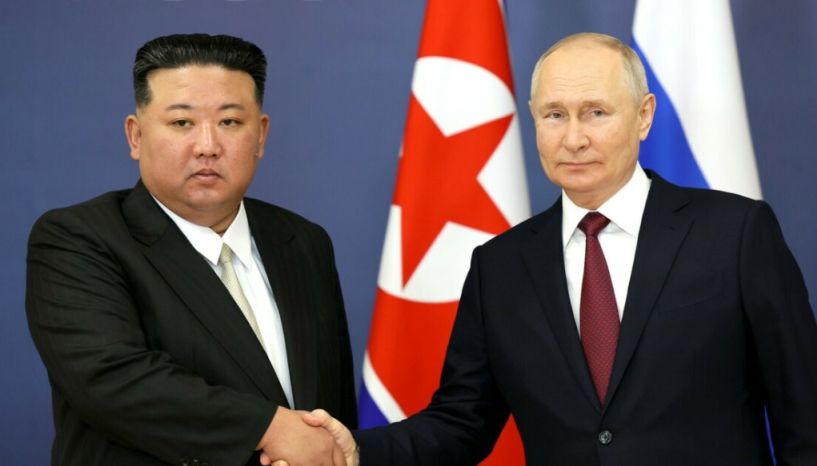By Eric Vandenbroeck and co-workers
What Putin And Kim Want From Each Other
After more than three
years of intense, self-imposed isolationism amid the COVID-19 pandemic, North Korean leader Kim Jong Un ventured outside
his country’s borders this week. Kim headed for the Russian Far East—on the
same armored train once favored by his father—to meet Russian President
Vladimir Putin. It was Kim’s first meeting with a foreign leader since 2019.
Playing host allowed the Russian president to project an image of relative
diplomatic normality amid his diplomatic isolation, crystallized by his
absences from the recent G-20 and BRICS (Brazil, Russia, India, China, and
South Africa) summits.
Putin greeted Kim
informally in Russian, familiarizing himself with the North Korean leader he
first met in 2019. Kim, for his part, professed his country’s fealty to
Moscow’s “sacred struggle” against Ukraine. While both aimed to project
solidarity against a global order dominated by the West, their strategic
convergence stems from a more transactional logic spurred on by difficult
circumstances for both leaders. Simply put, each man has much to offer the
other.

Kim and Putin have
held their cards close to their chests about what they’ve sought from each
other. Unlike typical leader-level summitry, the two chose not to issue any
joint statement hinting at what they may have discussed or agreed to. However,
the optics of their meeting and other recent high-level diplomatic engagements
between the two countries were much more overt.
In the lead-up to
Kim’s trip, Russian Defense Minister Sergei Shoigu, flanked by other senior
defense officials involved in the procurement of weaponry, toured an exhibition
hall in Pyongyang plush with North Korean weaponry. The fact that North Korea
remains under a comprehensive United Nations Security Council-backed arms
embargo that Russia has long supported seems not to be much of a hindrance.
The choice of venue
for the Kim-Putin summit was equally unsubtle. The two leaders met at Russia’s
relatively new Vostochny Cosmodrome, an eastern
spaceport designed to reduce Moscow’s reliance on Kazakhstan’s Baikonur
Cosmodrome. Putin said the decision to meet there was an acknowledgment
of Kim’s “great interest in rocket technology,” noting the North Korean
leader’s push to “develop space … that’s why we came to Vostochny
Cosmodrome,” Russian state media reported. Indeed, North Korea is trying to develop a mature space
program, but as its two failed satellite launch attempts this year indicate, it
has room to grow. Russian assistance with space launch technology could advance
Pyongyang’s military modernization ambitions, including developing military
reconnaissance satellites.
But Pyongyang seeks
other perks from its full-throated support of Russian interests. Following his
meeting with Putin, Kim’s train carried on toward Komsomolsk-on-Amur, where he
visited a factory producing Su-35 and Su-57 fighter jets—systems far more advanced
than the obsolete airframes currently available to the Korean People’s Air
Force. Even short of procuring new fighters, North Korea could benefit from a
steady supply of spare parts and components to shore up its existing fleet of
Soviet-origin military aircraft, significantly improving their airworthiness
and reliability.
Kim will also likely
seek access to raw and composite materials from Russian suppliers that could
supercharge his indigenous missile programs. North Korea has long relied on
organized criminal networks to source materials such as Kevlar and aramid fibers from
Russia for use in its advanced missiles. Active Russian facilitation of such
transfers—while a violation of United Nations sanctions—would assist in
fulfilling Pyongyang’s military ambitions. North Korea could also seek covert
technical assistance. Putin’s contempt for international rules and norms may
make forms of technical cooperation that were previously unthinkable between
the two countries increasingly feasible.
Beyond hardware, Kim
likely approached Putin about the prospect of food aid, which could address
severe nutritional
challenges that have intensified in North Korea through the pandemic. Such assistance would not
violate sanctions but help Kim address food shortages that he has openly
acknowledged in recent years, even as he has continued to spend lavishly on
nuclear modernization. Separated by only their own land border and territorial
waters, North Korea and Russia can easily conduct large-scale transfers.
Russia can also offer
its diplomatic support for North Korean goals. Pyongyang has benefited
considerably from Russian—and Chinese—shelter at the United Nations Security
Council. Since the collapse of the last round of U.S.-North Korea diplomacy in
2019, both Beijing and Moscow have been unequivocal in their rejection of any
new sanctions or even formal censure at the United Nations—a far cry from their
acquiescence to comprehensive, sectoral sanctions in 2016 and 2017. Last year,
neither state was willing to support a presidential statement condemning
Pyongyang’s testing of intercontinental-range ballistic missiles.
Meanwhile, Moscow’s
interest in the latest meeting likely lies in North Korea’s substantial
inventory of artillery shells and rocket artillery munitions that are
reverse-compatible with Soviet-era launchers used by Russian armed forces. U.S.
intelligence sources, cited by the New York Times last
September, suggested such transfers had already occurred, but this was likely premature. Instead, the recent
spate of bilateral diplomacy between North Korea and Russia appears to have
been designed to facilitate such a transfer, which a White House
spokesperson said was “actively advancing” after Shoigu’s visit.
Despite their attempts
to project a shared ideological front at the summit, Putin and Kim may not be
willing to yield to the other’s demands fully—at least, not yet. North Korea,
for instance, may seek access to sensitive Russian naval nuclear propulsion
technology, which Moscow is unlikely to part with for little in return.
Similarly, Russia may seek to acquire more advanced North Korean missiles for
possible use in Ukraine, but Kim may prefer to keep these for his own national
defense and deterrence needs.
For updates click hompage here